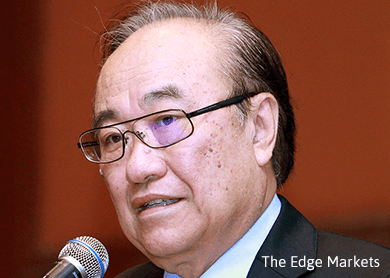
(Aug 6): Malaysia needs laws on political financing to ban foreign contributions and deposits of donations into individual accounts, said Datuk Paul Low, the minister in charge of governance and integrity, following the Malaysian Anti-Corruption Commission's (MACC) announcement that RM2.6 billion in the prime minister's personal accounts came from a foreign donor.
The minister in the Prime Minister's Department said there was currently no regulation on political financing in the country, although there are some regulations on election expenditure.
He said there was an urgent need to regulate political financing to ensure transparency.
"There is an urgent need to enact legislation to prohibit all political funding from foreign sources or from donors that are not Malaysian entities or citizens.
"All political donations must not be given into accounts of individuals but only into accounts of the political party and all donors must be publicly disclosed," Low said in his speech at the Malaysian Institute of Chartered Secretaries and Administrators (Maicsa) annual conference this morning.
On Monday, MACC said the US$700 million (RM2.6 billion) which was channelled into Prime Minister Datuk Seri Najib Razak's personal bank accounts came from donors and not from state strategic investor 1Malaysia Development Bhd (1MDB).
The anti-graft agency also confirmed that the donor is from the Middle East but did not name the source. Last night, MACC said it would ask Najib to provide an explanation on the donation.
Allegations of RM2.67 billion in Najib's accounts first surfaced in a report by The Wall Street Journal (WSJ) on July 2, citing documents from Malaysian investigators.
WSJ said the source of the funds were unknown, but came through 1MDB-linked entities in various tranches, the largest of which – US$681 million – was channelled to Najib's accounts in March 2013, ahead of the general election in May that year.
The prime minister denied taking 1MDB funds for personal use, but had not directly addressed the fund transfers.
A few of Najib's Cabinet members had previously said that there was nothing wrong in money being funnelled into his personal accounts as he had the capacity to be a trustee for Umno, of which he was president.
Low said he hoped to meet all political parties to present his proposal, adding that his suggestions were basic provisions that already existed in countries which have political financing regulations.
He said without any framework to regulate such funding, money could be used to influence the political process in negative ways, such as “vote buying” and in influencing policy decisions.
"It can even threaten the democratic process and values, and support political corruption, including 'state capture'," he added.
Citing an example, the former Transparency International-Malaysia president said interest groups may buy access to the corridors of power through contributions to political parties.
"Foreign interest and even criminal groups can use money to manipulate politics in their favour, while government parties may use state resources to maintain their grip on power," he said.
As such, an open and transparent funding of parties and candidates is crucial in the fight against corruption and to gain the citizens’ trust in politics, he said.
He said transparency would protect against the infiltration of illicit money into politics, and encourage parties and candidates to be more accountable and adhere to rules.
Transparency on political funding is an issue that has been recognised internationally through the United Nations Convention against Corruption (UNCAC), which Malaysia has acceded and ratified, Low added. – The Malaysian Insider